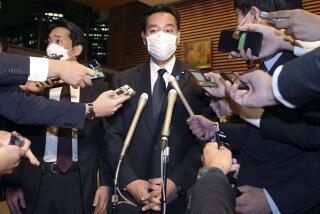Ex-Premier Takes Fiscal Hot Seat in Japan’s Cabinet
- Share via
TOKYO — Kiichi Miyazawa, a savvy senior statesman generally respected by the financial markets, agreed Wednesday to become finance minister, the most sensitive and high-profile post in the Japanese Cabinet.
As finance minister, Miyazawa will be charged with presiding over the monumental tasks of reforming the nation’s ailing banking sector as well as leading the world’s second-largest economy out of a withering recession that threatens to infect the U.S. and Europe as well.
An apparently reluctant Miyazawa, 78, who has served as finance minister and prime minister in the past decade, was drafted for the post by Keizo Obuchi, who was approved today as Japan’s next premier by parliament’s lower house. (Final confirmation was expected later in the day.) Though most of the other Cabinet appointees are party stalwarts, Obuchi did tap Taichi Sakaiya, a political outsider, author and outspoken advocate of reform, to chair the Economic Planning Agency, a lesser-known governmental body whose influence may soon rise.
Obuchi is worried about the survival of the government as well as about Japan’s international credibility, said Gerald Curtis, a political science professor at Columbia University specializing in Japan, after meeting in Tokyo with top politicians and opinion-makers. “He’s trying to get in place a team that will simply by its existence have some impact on the markets until they get something done, because it’s going to take some time to get anything done.”
Things could get worse before they get better if Japan is serious about restructuring its economy and writing off the $620 billion in bad or questionable loans weighing down its banks. If Obuchi and Miyazawa can’t turn things around quickly, however, it could spell the downfall of the Liberal Democratic Party, or LDP, as well. Though voters earlier this month routed the party in upper house elections, forcing Prime Minister Ryutaro Hashimoto to resign, the LDP still has a majority in the more powerful lower house and thus chooses the prime minister.
Tokyo’s markets have rallied in the past few days on rumors of Miyazawa’s appointment. But Miyazawa didn’t officially accept the post until Wednesday night, well after the financial markets closed. The dollar was trading at 142.53 yen today, up 1.44 yen from its level of 141.09 yen Wednesday.
Miyazawa is highly regarded for his deep knowledge of the entrenched bureaucracy: He began his career working in the elite Finance Ministry after graduating from prestigious Tokyo University. His economic acumen and broad personal ties with international financial leaders with whom he converses in fluent English have earned him high marks.
“He is widely known and has many good friends in the U.S. and knows how to communicate with the rest of the world,” said Takashi Kiuchi, research director at the Long-Term Credit Bank of Japan. “He has been the umbrella figure in policies toward the financial sector and the ‘bridge bank’ plan, so he’s ideal from that perspective.”
Among his first tasks will be pushing that bridge bank legislation through parliament in the next few weeks. The plan, which would cushion healthy borrowers if their lending bank fails, is a step toward the overhaul seen as necessary to offset a credit crunch that has deprived borrowers of working capital.
It may be some time before things get moving, however. The legislation reportedly wouldn’t be effective until March 31, 2001, according to proposed drafts of the bill released Wednesday.
In addition, Miyazawa will spearhead Obuchi’s campaign platform, which vowed a $70-billion economic stimulus package and $42.5 billion in tax cuts.
Miyazawa is known for his lead role in a restructuring package adopted early this year to stabilize the financial system after the collapses of the venerable Yamaichi Securities Co. and Hokkaido Takushoku Bank last fall. The plan produced a widely heralded $210-billion program to protect depositors.
But the plan also shored up marginal banks by recapitalizing them, leading critics to charge that Miyazawa is hardly the best choice for free-market reforms.
Another lingering question is whether Miyazawa, who turns 79 in October, has the endurance and vitality to do the job.
“We wonder if he has the physical stamina to exert the type of leadership necessary,” said Hiroshi Nishiguchi, a spokesman for the Clean Government opposition party. In addition, Miyazawa’s experience as finance minister was during years of heady growth for Japan, not amid a crisis.
Still, Miyazawa probably won’t have to worry about his political career, which could make him more aggressive about taking unpopular actions.
Miyazawa resigned as finance minister in 1988 amid a broad-reaching influence-peddling scandal in which Recruit Co. had sold shares of a real-estate subsidiary to politicians before they were made available to the public. He was never found guilty of wrongdoing.
He was reincarnated as prime minister from November 1991 to August 1993, when he is probably best remembered by Americans for the unfortunate incident when then-President George Bush, seated beside him, became ill at a state dinner in Tokyo.
Times staff writer Sonni Efron in Tokyo contributed to this report.
More to Read
Sign up for Essential California
The most important California stories and recommendations in your inbox every morning.
You may occasionally receive promotional content from the Los Angeles Times.













